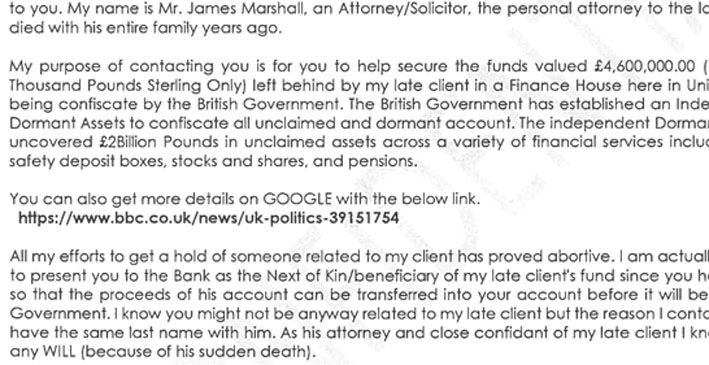In this day of web-based scams, Gerry Wessel is less than pleased to know some fraud artists are still using old-fashioned letters to find victims to bilk.
Don't worry, Wessel didn't fall for the ploy - he went to the Citizen instead to raise the alarm in case others in Prince George have been finding the same type of thing in their mail.
Wessel recently received a letter from an "Attorney/Solicitor" in the United Kingdom asking for his help to secure 4.6 million "Sterling Only" in unclaimed assets left by a client "who died with his entire family years ago."
"All my efforts to get a hold of someone related to my client has proved abortive," the writer continues. "I am actually asking for your consent to present you to the Bank as the Next of Kin/beneficiary of my late client's fund since you have the same last name, so that the proceeds of his account can be transferred into your account before it will be confiscate (sic) by the British Government."
The writer goes on to ask Wessel to contact him and essentially help to get hold of the money under false pretenses.
At first glance, the letter looks legitimate but upon rereading it soon becomes apparent that something is amiss. The letter is rife with inconsistencies, awkward phrasing, poor grammar, and missing words and punctuation - not the type of correspondence that would come from a lawyer's office.
Wessel also noticed the address on the envelope was different from the address on the letterhead. And when he typed in the firm's name and address on the internet, there was nothing to be found.
(A search on Google maps uncovered an address matching the one on the letterhead and under a slightly different spelling but leading to a home, not a lawyer's office).
About the only thing accurate was a link to a story on BBC headlined "Charities set for 2bn funding from dormant accounts."
"How many other people could've received this letter with somebody else's name in there instead of Wessel?" he said. "And it looks good an they contact (the fraudsters)."
The letter appears to be a variation on what the Canadian Fraud Centre website calls the "inheritance scam" or "foreign money offer."
"Consumers receive a solicitation through the mail offering or requesting assistance to transfer a large sum of money from a foreign country," the CFC says.
"In many cases, the potential victim is advised that a distant relative has died and they are entitled to a large inheritance. Before any funds can be released, the consumer must pay one or more fees upfront.
"This is sometimes referred to as Nigerian, 419 or West African fraud. Consumers report receiving solicitations from Canada, United States, United Kingdom, Spain, Hong Kong, China, Brazil, Japan, Italy, Malaysia and South Africa."
The CFC offers the following advice:
- Beware of persons looking for a trustee or heir. Legitimate estates do not solicit in this manner.
- Beware of tragic deaths and persons looking for help moving a large sum of money.
- Discard any mailing offering a percentage of a fortune for doing little else than providing banking details.
A full copy of the letter is posted with this story at pgcitizen.ca.



